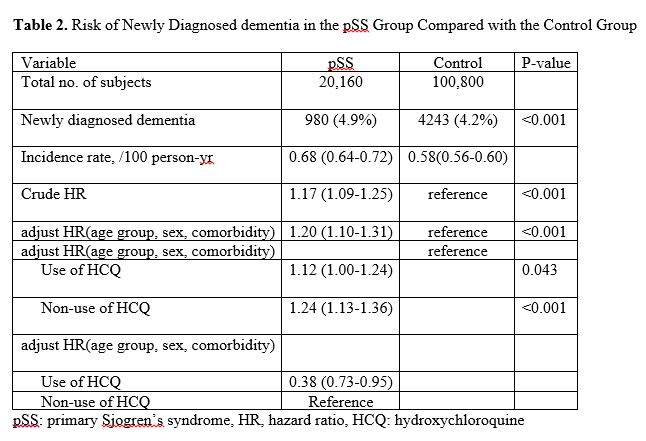Session Information
Date: Tuesday, November 14, 2023
Title: (2177–2194) Sjögren’s Syndrome – Basic & Clinical Science Poster II
Session Type: Poster Session C
Session Time: 9:00AM-11:00AM
Background/Purpose: Autoimmunity and systemic inflammation may play a role in early-stage dementia. Few studies have investigated whether primary Sjogren’s syndrome (pSS) increases the risk of dementia. As hydroxychloroquine (HCQ) has recently been shown to inactivate STAT3 in microglia, neurons, and astrocytes, we also evaluated the association of HCQ use with the development of dementia in patients with pSS.
Methods: This cohort study used data from the Health Insurance Review and Assessment Service, a representative national healthcare database in Korea. From the database, we established a cohort of patients with pSS without a history of dementia between January 2008 and December 2020. The control group consisted of sex- and age-matched individuals with neither a history of autoimmune disease nor dementia. We assessed the incidence of newly diagnosed dementia in patients with pSS and the matched cohort. A Cox proportional hazard analysis was performed to identify the association of pSS with the development of dementia.
Results: We identified 20,160 patients with pSS and 10,800 matched controls. The incidence of dementia was 0.68 (95% confidence interval [CI], 0.64-0.72) cases per 100 person-years in pSS, and it was 0.58 (95% CI: 0.56-0.60) in matched controls. In multivariate analysis adjusted for age, sex, and comorbidities, the adjusted hazard ratio (aHR) of developing dementia was 1.20 (95% CI 1.10–1.31) times greater in the pSS group than in the matched controls. When stratified by the use of HCQ, HCQ users had 1.12 (95% CI 1.00-1.24) times the risk, and HCQ non-users had 1.24 (1.13-1.36) times the risk of developing dementia compared to the matched controls. Indeed, multivariate analysis showed that the use of HCQ lowered the development of dementia in patients with pSS (aHR 0.83, 95% CI 0.73-0.95).
Conclusion: pSS is independently associated with the development of dementia. HCQ may have a preventive role in dementia for patients with pSS.
To cite this abstract in AMA style:
Lee K, Jeon H, Kim H, Seo G. Increased Risk of Dementia in Patients with Primary Sjogren’s Syndrome: A Nationwide Population-based Cohort Study [abstract]. Arthritis Rheumatol. 2023; 75 (suppl 9). https://acrabstracts.org/abstract/increased-risk-of-dementia-in-patients-with-primary-sjogrens-syndrome-a-nationwide-population-based-cohort-study/. Accessed .« Back to ACR Convergence 2023
ACR Meeting Abstracts - https://acrabstracts.org/abstract/increased-risk-of-dementia-in-patients-with-primary-sjogrens-syndrome-a-nationwide-population-based-cohort-study/

